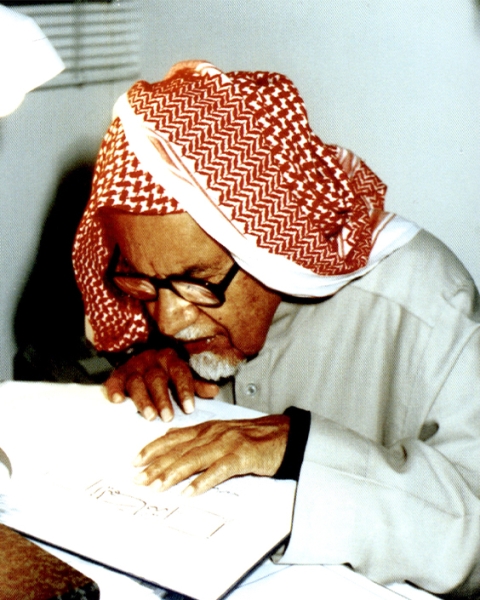
Hamad Bin Mohammed al-Jasser (1909-2000) was a writer, historian, and genealogist. He was one of the founders of journalism and publishing in the Kingdom of Saudi Arabia. He published 'al-Yamamah Magazine' in 1953. Then, he established 'Arab Bookstore' in Riyadh City in 1954, and in the same year, he founded the National Printing and Publishing Company, which contributed to the establishment of Riyadh's printing presses and met the region's need for publishing and distribution.
Hamad al-Jasser supervised the founding of the al-Yamamah Press Establishment in 1965, from which the daily Riyadh Newspaper and the weekly al-Yamamah Newspaper were launched. This was followed by his establishment of 'Dar al-Yamamah Publications for Research, Translation and Publishing' which published the monthly 'al-Arab Magazine' in 1966.
Hamad al-Jasser was born in al-Burood Village, north of Riyadh City. He studied in Katatib (traditional schools) during the early years of his life and later became a teacher for young people in one of Riyadh's mosques. He was then appointed as a writer for one of the judges in a bedouin settlement before moving to Makkah al-Mukarramah in 1930 to obtain a qualification in Sharia law from the Saudi Scientific Institute.
Work in the judiciary
Al-Jasser repeated his teaching experience after graduating from the institute and was appointed in Yanbu City in 1935. Two years later, he joined the judiciary and was appointed as a judge for Duba Governorate, Tabuk Province, in 1937. He served there for only one year before returning to teaching in Jeddah City until he had a scholarship opportunity to Cairo to complete his university studies in 1939.
However, Hamad al-Jasser was not destined to complete his studies. After spending six months at the Faculty of Arts at Fouad I University (currently Cairo University), World War II forced expatriate students to return to the Kingdom to ensure their safety from the circumstances and changes of the war. After his return, he resumed his work in teaching in al-Kharj Governorate, Riyadh Province.
Work in education
In 1944, Hamad al-Jasser was appointed by a Royal Order as the Head of the Education Supervision in al-Dhahran and was assigned to supervise education in the cities of the Eastern Province. In 1949, he moved to work in Najd and supervised education development in Riyadh Province. In Riyadh, he worked as an assistant to the Kingdom's Grand Mufti, Mohammed Bin Ibrahim Al al-Sheikh. Through this position, he was able to supervise the establishment of the first scientific institute in the province, 'Riyadh Scientific Institute', where teachers were prepared to teach in the cities of the province and its affiliated governorates.
Writings
Hamad al-Jasser began publishing his writings in 1950, with his first publication being about the history of Souq Okaz. His books then followed in the fields of history, geography, archaeology, and genealogy. They are considered authentic references in their field. These include Madinat ar-Riyad 'abr at-tawar at-taareekh (Riyadh City Through the Stages of History) , the Gazetteer of the Saudi Arabian Lands in eight volumes, and al-Durar al-Fara'd al-Munazzamah bi Akhbar al-Hajj wa Tariq Makkah al-Mu'azzamah (The Organized Pearls with News of the Pilgrimage and the Road to the Holy Makkah), by al-Jaziri, for which he received the King Faisal International Prize in 1996 for Service to Arab Heritage.
In 1954, Hamad al-Jasser was managing the two colleges that had been established successively in Riyadh City, the 'College of Sharia' and the 'College of Arabic Language'. He received awards at the Saudi level, including the State Appreciation Prize in Literature in 1984 and the King Abdulaziz Medal of First Class in 1997. He also received an honorary doctorate from King Saud University in 1996.
Death
Hamad al-Jasser lived for about ninety-three years, spending nearly eighty years of his life in journalism, pioneering publishing and history. After his death, in 2000, his students and friends established the Hamad al-Jasser Charitable Foundation, from which the Hamad al-Jasser Cultural Center was launched.
Related quizzes
Related articles


